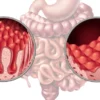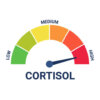
What causes IBS?
Irritable bowel syndrome (IBS) is described as a functional bowel disorder that refers to a specific set of digestive symptoms. These IBS symptoms (outlined in the Rome IV criteria) include abdominal pain and alterations in bowel patterns, for example, diarrhoea or constipation. In some cases, bowel patterns can go between constipation and diarrhoea. It is also common for there to bloating and abdominal distention.
In addition to these digestive symptoms many of those with IBS report that this gut issue significantly reduces their quality of life.
Irritable bowel syndrome (IBS) is one of the most common digestive conditions which is understood to be present in 12% of the general population.
A single cause of IBS is not understood. However, a range of factors are known to be present with the potential to contribute to symptoms. These possible causes of IBS include:
- abnormal brain–gut interactions
- visceral hypersensitivity (increased nerve sensitivity)
- altered gut motility
- stressors
- immune activation in the gut
- intestinal permeability
- SIBO
- an altered gut microbiome [Source: PubMed]
In this blog, the main focus will be on the role of the gut microbiome in IBS.
What is the gut microbiome?
The gut microbiome describes the microorganisms within the digestive tract. The majority of these organisms inhabit the large intestine (the colon), however, the upper gut is also home to a certain population of these.
A large amount of focus has been paid to the microbiome with the gut bacteria receiving the most attention. However, the gut microbiome is home to other gut organisms such as viruses, fungi and archea.
When focusing on the bacteria within the gut microbiome, over 2000 species of gut bacteria have been identified. Within these species, 4 main groups (phyla) have been identified. These are:
- Firmicutes
- Bacteroidetes
- Proteobacteria
- Actinobacteria
The balance of these gut organisms is influenced by a variety of factors. These include:
- Diet
- Medications
- Lifestyle
- Genetics
Interestingly, diet, the use of medications and lifestyle factors all have a greater influence on the gut microbiome than genetics. [Source: PubMed]
These bacteria are also required for the normal development of the gut with imbalances leading or contributing to IBS-type symptoms. Animal studies have found that germ-free mice (mice without any gut bacteria) display IBS-type symptoms.
Not only do these gut organisms help to digest fibre from the food they also support the development of the gut immune system, help to maintain the strength of the gut lining and produce anti-inflammatory products that support human health and wellbeing.
Can the gut microbiome cause IBS?
While a balanced and healthy gut microbiome can support digestive health and gut function, changes in the gut microbiome may contribute to IBS symptoms.
The understanding of this process involves changes to the gut microbiome (generally referred to as dysbiosis) which can then trigger the gut immune system and a low-grade inflammatory response. Certain changes in the gut microbiome may also indicate the severity of IBS symptoms.
This same response is seen in post-infectious IBS. This type of IBS is where IBS symptoms start following an event of food poisoning or gastroenteritis. In this situation, immune activation, low-grade inflammation and changes to the balance of the gut microbiome are found. [Source: PubMed]
One way in which the gut can change is that fewer of the beneficial, anti-inflammatory species of bacteria are present. Alongside this, there can be a higher representation of the pro-inflammatory organisms. This can mean that more inflammation or present but the gut is less able to deal with this inflammation, resulting in ongoing IBS symptoms.
Alterations to the gut microbiome can involve changes to the balance of the bacteria and also other gut organisms such as fungi. The collection of fungal species within the gut is referred to as the gut mycobiome. Imbalances in the fungal species have been associated with the onset of increased sensitivity of the nerves within the gut. This is referred to as visceral hypersensitivity. [Source: PubMed]
Small intestinal bacterial overgrowth (SIBO), irritable bowel syndrome (IBS) and the gut microbiome
SIBO is defined as an overgrowth of bacteria in the small intestine. This is a region of the gut that is meant to have a relatively low concentration of bacteria when compared to the large intestine.
The symptoms of SIBO are considered to similar to be IBS with some research indicating that SIBO may be the underlying issue in up to 80% of those with IBS. Even with SIBO, an approach that should be considered is addressing the underlying reason for the overgrowth development.
These symptoms can include bloating, alterations in bowel patterns and abdominal pain. In more extreme cases malabsorption can also present.
Additional factors impacted can also include:
- Visceral sensation
- Immune activation
- Carbohydrate digestion and absorption
- Bile acid
- Intestinal epithelial permeability (leaky gut) [Source: PubMed]
The most common method for testing SIBO is via a breath test that measures hydrogen and methane production in the gut following the ingestion of lactulose. The reliability of this test is questioned by some. Even with a negative test result, the same underlying aspects can be responsible for the symptoms and may respond positively to a ‘SIBO-type’ approach.
This may be due to the symptoms being caused by an imbalance in the small intestine (dysbiosis) rather than an overgrowth. [Source: PubMed]
How can I improve my gut bacteria for IBS?
Prebiotics are carbohydrates that support the growth of beneficial gut bacteria. These are found in a wide range of foods such as garlic, lentils, beans and onions. They can also be administered via supplements such as GOS, Inulin and PHGG.
Prebiotics have been found to support the growth of key beneficial gut bacteria such as bifidobacterial. At the same time they can reduce the levels and inhibit the growth of potentially harmful gut bacteria that include Bacteroides, Clostrida, and Coliforms. [Source: PubMed]
For those with IBS, prebiotics may increase symptoms. This can be due to alterations in the gut microbiome leading to more gas production combined with increased sensitivity in the gut lining.
This we also found in a study using 20g of Inulin per day. This initially led to an increase in IBS symptoms, however, these improved over the course of the treatment leading to an overall improvement in IBS symptoms. This indicated the ability of the gut to adapt when provided with prebiotics.
Other studies have used lower doses of inulin as well as prebiotics such as PHGG and GOS.
IBS studies using GO over a 6 week period resulted in a significant improvement in IBS symptoms of bloating and flatulence. Patients also reported an overall improvement in other symptoms. This may be a direct result of this prebiotic supporting the growth of the beneficial bacteria, bifidobacterial. [Source: PubMed]
Probiotics, the gut microbiome and IBS
Probiotics are live organisms that when given in the correct amount have a beneficial outcome on the individual. Probiotics have been extensively studied in those with IBS with many types of probiotics improving the symptoms of IBS. These symptoms of
While this does often involve improving the balancing of the gut microbiome, the way in which probiotics do this may be indirect. This can be due to the ability of probiotics to reduce nerve sensitivity in the gut as well as their anti-inflammatory effects. [Source: PubMed]
Best food and diet for IBS
A low FODMAP diet is commonly used for those with IBS. This diet removes foods that contain certain types of carbohydrates. While these foods are considered healthy, the carbohydrate they contain may either be poorly absorbed or mal-fermented in those with IBS, leading to symptoms. Therefore, avoiding these foods can be a way to reduce symptoms.
>>READ MORE ABOUT THE LOW FODMAP DIET
Even with the benefits of improving symptoms, a low FODMAP diet may have certain limitations. This includes the highly restrictive nature of the diet as well as its complexity. This can mean that this IBS diet is best followed under the supervision of a nutritional therapist.
The long-term use of a low FODMAP diet may also lead to negative changes in the balance of the gut microbiome. This is due to the beneficial role of FODMAPs for gut health. So while reducing these foods manages symptoms, avoiding triggers doesn’t get to the underlying issue.
Studies have found that beneficial species such as Bifidobacterium, and Faecalibacterium prausnitzii are reduced in the gut microbiomes of those following a low FODMAP diet.
For many, alongside a low FODMAP diet (to manage symptoms) certain supplements such as probiotics and prebiotics may be important to address the underlying cause in the gut. This is done with the aim of the low FODMAP diet only being a short-term approach in which the underlying issue and cause of IBS are addressed in the gut. [Source: PubMed]
IBS and gut health therapy
The approach that can be taken to resolve symptoms is to address the underlying cause. While avoiding foods may reduce symptoms, increasingly restrictive diets do no address the cause of the issues.
Rather than there being a single cause of all cases of IBS, a combination of factors may be responsible for IBS symptoms. These can vary from person to person and require personalised approaches.
These include IBS diets, appropriate supplements to address the causes of IBS as well as IBS tests, which include tests to assess the balance of the gut microbiome.
Working with a gut health practitioner can guide and direct this process, to work to address gut issues like IBS, rather than just manage symptoms.






